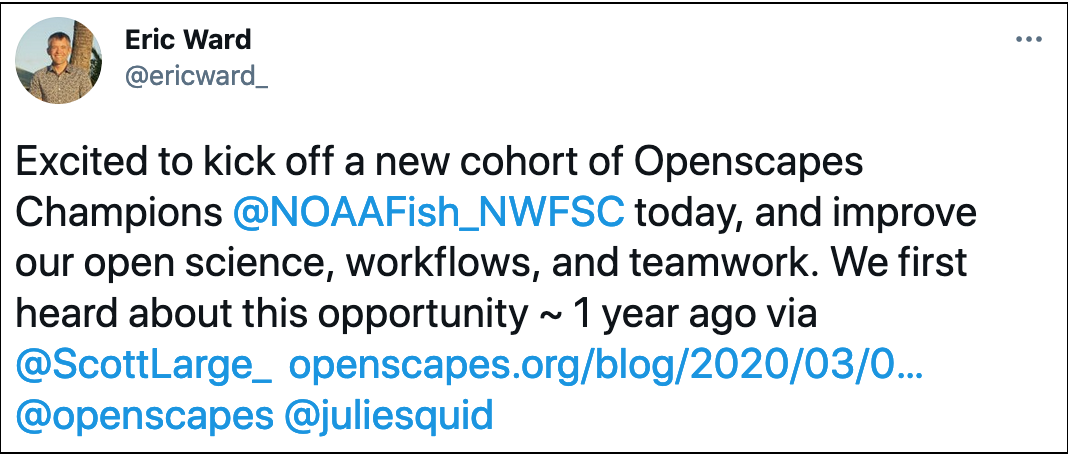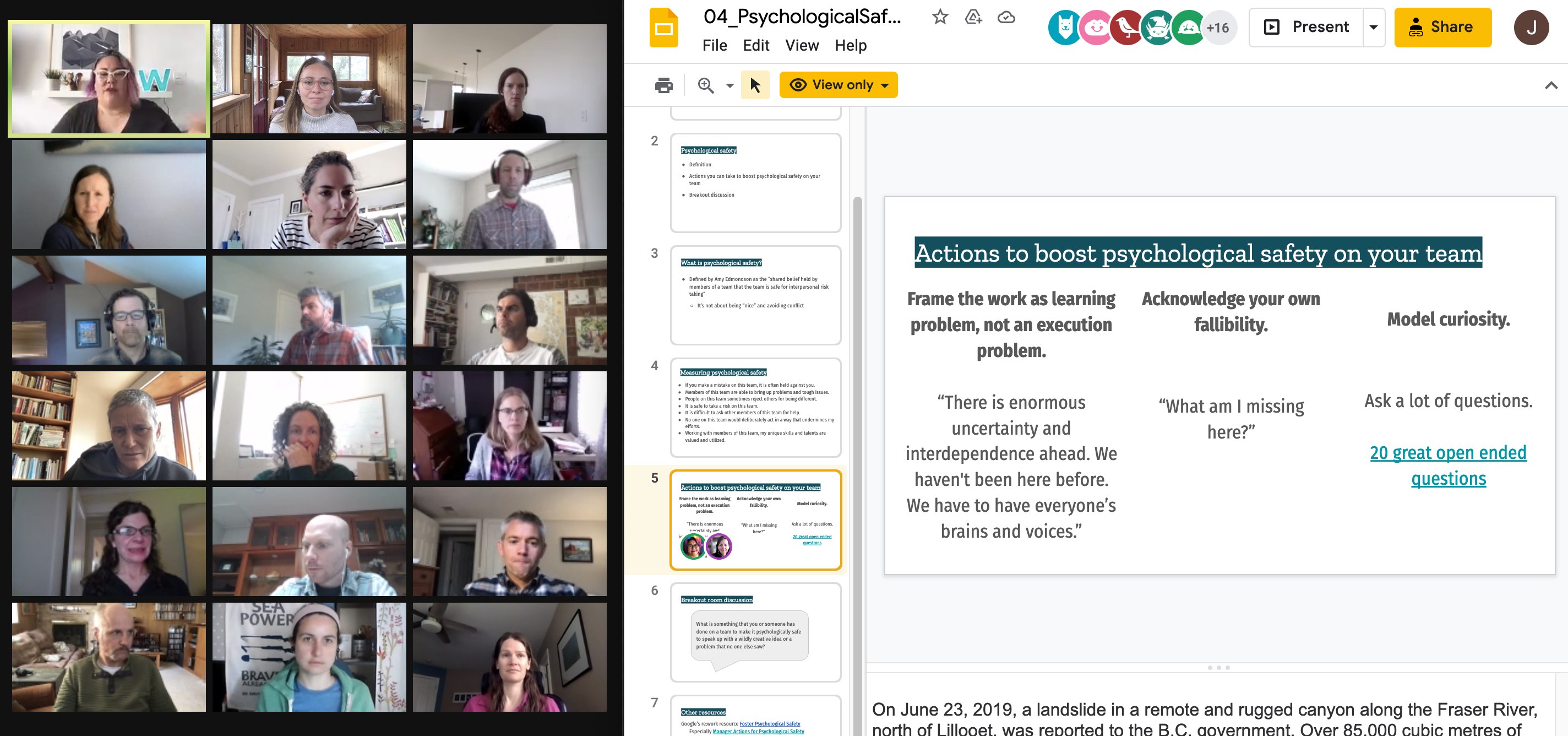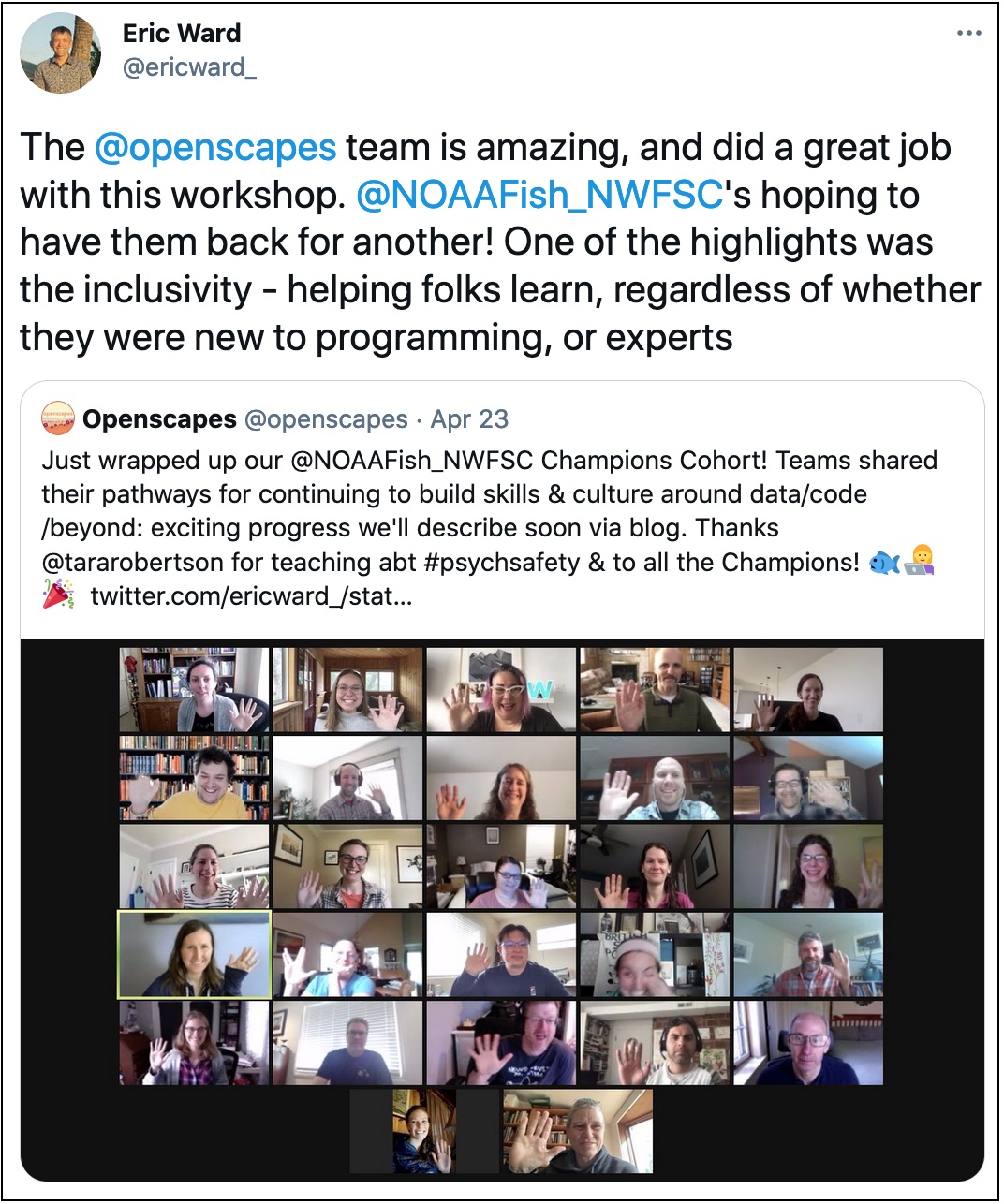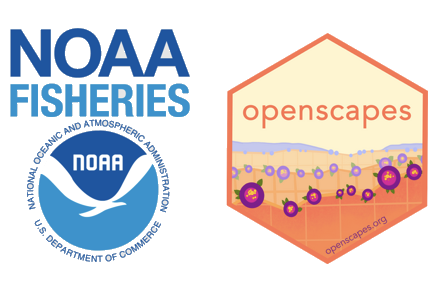NOAA NWFSC Openscapes Champions Cohort
Starting in March, Openscapes led a 2-month Champions Cohort with the National Oceanic and Atmospheric Administration (NOAA), working with thirty fisheries scientists from NOAA’s Northwest Fisheries Science Center (NWFSC). These scientists were interested in exploring new approaches to data analysis and stewardship, and connecting with others at NWFSC with the same intent. This post focuses on what the cohort setup and participants achieved. It is co-authored with Dr. Eric Ward from NOAA NWFSC. See https://openscapes.org/champions for more background on the Champions program.
NWFSC cohort setup and structure
Eric Ward, a statistician and quantitative ecologist at NOAA’s NWFSC, saw the value of the Openscapes Champions program following the Northeast Center Cohort coordinated by Scott Large and worked with us to bring the program to scientists at NWFSC. Thirty fisheries scientists signed up for the NWFSC cohort, interested in exploring new approaches to data analysis and stewardship, and connecting with others at NWFSC. Unique to this cohort, participants signed up as individuals and were assigned a team based on which of the four NWFSC divisions they represented; Champions cohorts otherwise are designed for a team lead to sign up their group and participate together with their team members.

We piloted a 2-month version of the Champions program, which we knew would cover half the content of the 4-month version, but were excited to test this as a “kick-start” for participants. This 2-month version had four sessions, or “cohort calls”. We created agendas for the 4 cohort calls by adapting the Openscapes Champions Lesson Series. The full list of lessons we covered during our four cohort calls were:
- Introducing the Openscapes mindset and better science in less time
- Data and coding strategies for future us
- Onboarding to collaborative research with GitHub Issues and further details from the Ocean Health Index transition
- Psychological safety and team Pathway presentations
This curriculum had several new and modified lessons compared to previous cohorts. We introduced the Pathways template in Call 1 so that participants could immediately start thinking about where they started in terms of the tools and practices for reproducibility, collaboration, and communication. Over the course of two months, the NWFSC cohort continued to evolve their Pathway, articulating their needs and identifying next steps. One of Eric’s observations was that the Pathways concept fit perfectly into the professional development tools being used at the NWFSC:
“As part of the ongoing strategic visioning process, NWFSC staff have been creating individual professional development plans. Much like the Openscapes Pathways template, these individual plans have helped employees identify new opportunities and set short and long term goals.”
Iterating the Champions lesson series
In response to questions and feedback in the second call on several participants having similar reproducibility challenges with their collaborators, we created a new lesson for the third call. Here we shared more details about the Ocean Health Index (OHI) transition to open science: what was it like day-to-day switching from a workflow with email attachments to a workflow on GitHub? And how did we decide what to continue to keep in R scripts as we started using RMarkdown more for reproducibility, communication, publishing, and engaging with stakeholders? These stories will likely be introduced in earlier calls in future cohorts as we continue to iterate.

Tara Robertson, a diversity, equity, and inclusion consultant working with Openscapes, created and led a new lesson on psychological safety, which is defined by Amy Edmondson as the shared belief held by members of a team that the team is safe for interpersonal risk taking. We ended with this new lesson because making these technical open science changes we discussed throughout the NWFSC Cohort requires psychological safety, and the NWFSC Champions had begun cultivating this safety within the cohort and are now empowered to take it out into their daily work.
Increasingly, the Champions lesson series includes example workflows and stories from previous Champions cohorts, including the 2020 workshop at NOAA NEFSC. For example, Scott Large’s group has continued their Seaside Chats and use GitHub Projects to manage them openly, and Gavin Fay’s group has written a Lab Manual stating their code of conduct and common practices in their group, including protocols for onboarding and offboarding. Additionally, Kimberly Bastille led a 2020 publication for integrated ecosystem assessments (IEA) called Improving the IEA Approach Using Principles of Open Data Science, and is a high-profile example of the importance of open data science in applied research.
What did the participants achieve?
At the beginning of this shorter cohort with modified team structure, we had some questions like: Would this shorter 2-month format be valuable for participants to get on a path for more open and collaborative research? Would the loose rather than formal team structure in the NWFSC cohort still allow for connections with others at NWFSC so they can learn together and support each other? The answers were resounding yes! And yes!
In the fourth and last call, eleven teams presented their pathways. Each team had something different resonate for their work from the three prior sessions, but everyone had ideas about what they were going to do next. Participants had taken Champions program material back to their larger research groups and discussed it during Seaside Chats, resulting in each team designing a pathway forward that they described to the cohort. One participant shared that it was validating to know that everyone is learning as we go, which was great to hear since a goal of Openscapes to make this learning journey less lonely. Even more, the cohort expressed that they knew that everyone’s varying degrees of technical expertise was okay and that they could use each other as support and pick up additional skills from each other and from other open communities, for example rOpenSci and RLadies Seattle.
Two teams identified that they will be integrating Git into their workflows. Many held the sentiment expressed by one participant, “There is an upfront time-commitment that provides long-term benefits in terms of product accessibility for both users and developers.” Further, they said that the value is clearer in investing in the upfront time commitment. From Eric:
“Data and code stored in email have a tendency to get lost, particularly when staff retire. Openscapes helped us understand the value of using version control, and tools like Github – both to preserve data, and archive changes. In the week after the workshops, we’ve created several new repositories for archiving work for long running projects. Thanks so much!”
What did Openscapes learn?
Regarding the team structure, we do still value the formal team structure where the PI or group supervisor attends with their team. We value team leads participating as part of an effort to change the culture through learning together — and as an endorsement of staff taking time and effort to transition towards open science tools and practices. In session 4 we were surprised at the number of smaller teams that existed within this cohort and in the survey, there was a request to spend some breakouts working together as a team. We were inspired as the cohort realized that across teams and divisions, that they could collectively affect change across NWSFC by collectively advocating for open science.
It turned out that in 2 months they learned a lot and achieved a lot with these first starting steps. We will follow-up with this cohort in 3 months to check-in and provide a bit more support and accountability to see how they are progressing on their pathways and what’s changed since this session. We were also so grateful to work with this cohort with Sean Kross, who is a UCSD PhD student studying human computer interaction, and Tara Robertson, who’s work with Openscapes is supported by Code for Science and Society (CS&S) to help us increase diversity, equity, and inclusion in Openscapes events.
We are so proud of the work the NWFSC cohort did and are looking forward to seeing how NOAA NWSFC continues to move toward open science. We hope that their leadership will inspire the broader scientific community through visible examples and leadership at NWSFC.
Thank you Eric and all the NWFSC Champions!

